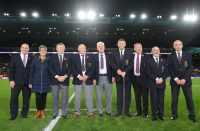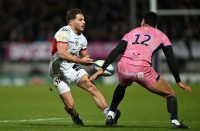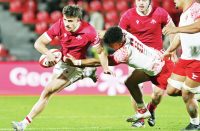 Every once in a while, the game is brought into more disrepute by the judiciary than by those dragged before them charged with breaking the law. It happened again the other day, Australia captain James Horwill getting off scot-free after being accused of stamping on Lions lock Alun-Wyn Jones in Brisbane. Video evidence made the ‘accidental’ verdict all the more surprising, prompting Brian O’Driscoll to refer to Horwill as ‘‘a lucky boy” and, more embarrassingly, the IRB to lodge an appeal against the judgment of the IRB-appointed panel.
Every once in a while, the game is brought into more disrepute by the judiciary than by those dragged before them charged with breaking the law. It happened again the other day, Australia captain James Horwill getting off scot-free after being accused of stamping on Lions lock Alun-Wyn Jones in Brisbane. Video evidence made the ‘accidental’ verdict all the more surprising, prompting Brian O’Driscoll to refer to Horwill as ‘‘a lucky boy” and, more embarrassingly, the IRB to lodge an appeal against the judgment of the IRB-appointed panel.
O’Driscoll, of course, remains the most celebrated victim of assault during a Lions tour – the alleged spear tackle by two All Blacks which resulted in the Irishman dislocating a shoulder in the first minute of the first Test in 2005.
It became infinitely more notorious through the failure of the citing commissioner to do anything about it. Willem Venter, a South African lawyer, decided that neither Tana Umaga nor Keven Mealamu, the two New Zealanders involved, had a case to answer.
It wasn’t the first time they had seen an opponent get away with blue murder. No action was ever taken against Nathan Grey for the forearm smash which broke Richard Hill’s jaw during the seminal second Test in Melbourne.
When Schalk Burger gouged Ireland wing Luke Fitzgerald during the Springbok series four years ago, an eight-week ban represented some sort of justice even if it happened to be too lenient for words.
Recalling such high-profile incidents, none more grotesque than Ronan O’Gara’s pummelling by Duncan Macrae in Sydney 12 years ago, creates an impression of put-upon Lions being beaten up by beastly colonials. In an historical context, nothing could be further from the truth.
If, as the say, truth is the first casualty of war, objectivity tends to be a close second. Lions tend to be portrayed as hapless victims and when the boots are to be found on the other feet, our boys are lionised as heroic defenders of the faith, ever ready to box their corner and return the low blows with interest. The 1989 Lions tour of Australia has long been acclaimed in these islands as a triumph. Down Under it is still viewed in a different, darker light with the old fox, Bob Dwyer, unfailing in his condemnation of Finlay Calder’s team as “the dirtiest team” he had ever seen in international rugby.
On the eve of the third Test, which the Lions won to take the series, the Australian Rugby Union took the unprecedented action of protesting against the ‘‘violence in the game” and preparing a video of the incidents to be viewed by the IRB.
According to Dwyer, the Lions “clearly put on a premeditated fight to see if we could fight as well as play footie”. They couldn’t, lost the series 2-1 and claimed that an unnamed member of the squad supposedly confessed that it was the English coppers wot done it – Wade Dooley, Paul Ackford and Dean Richards.
Whatever the rights or wrongs, 1989 must have been like afternoon tea at the vicarage compared to the systemic brutality of the 1974 tour of South Africa. The Lions decided on arrival that they would not be taking any prisoners: “If you start it, we’ll finish it.”
They were as good as their word. The invincibility of that tour has been duly lauded but in a permissive age when home-town referees often made little or no attempt to impose law and order, anything went.
The authorities did what they always did in those days. They turned a blind eye and not once during all manner of mayhem was anyone sent off. The tour captain, Willie John McBride, initiated the ‘99′ call for any trouble– one in, all in. “Let me tell you straight, I took no pride in helping flatten opponents off the ball when they had done nothing wrong,” he wrote in his autobiography.
“I did not delight in the carnage that unfolded before me in East London.
“I wish it had never been necessary to use such tactics but I wanted the locals to be perfectly clear about it. We were there to play rugby and win fairly and squarely but if they wanted to start something, then we’d make damn sure we finished it on our terms.”
McBride had been on three tours in the Sixties and seen the Lions beaten into submission too often to let it happen again. The one which left the deepest mark, New Zealand in 1966, moved one of his contemporaries, Jim Telfer, to speak his mind.
To his credit, the Scot said to hell with diplomacy and used the captain’s speech after the Canterbury match to speak his mind rather than waste his breath on the usual platitudes: “I’m not going to say today’s game was dirty because every match I have played in on this tour of New Zealand has been dirty.”
McBride’s experience of more rough stuff in South Africa two years later explained why the ’74 squad contained hard men well able to stand up for themselves, men like Bobby Windsor.
As the Iron Duke said himself: “I punched and booted them at every opportunity and you never had to wait very long for the opportunity to present itself. So I went into every match thinking to myself, right, I’m going to start putting it about here as soon as I can. I’m going to boot, bite, butt and do anything to anyone who starts messing me about.”
He and the rest got away with it because they knew most referees would do nothing about it. There were very few cameras back then, no citing commissioners, no TMO’s and, more often than not, no justice.
Many perplexed at the “accidental” ruling of the Horwill case will argue that nothing has changed. Be that as it may, the most striking lesson from history is that it takes two to tango.
3 Comments
Leave a Comment
You must be logged in to post a comment.























I didn’t know anyone thought the Lions were Angels!
No one has claimed that the Lions are angels. But if you have to go back 40 years to give an example of Lions bad behaviour (the opponents were just as bad) is a little clutching at straws. Especially when the Nathan Grey, Umaga/Mealamu, Burger and Horwill incidents have happened in the 21st century and well into the professional era. Lets stick with recent history and I think Jackson will find that we’ve had our fair share of bad boys. But with a subtle difference, for example Danny Grewcock was rightly punished. The complaint about Burger was that he was only given a yellow card for red card offence and then got off lightly with his ban. Horwill, Grey, Umaga and Mealamu never got banned at all.
Alun Wyn-Jones is not responsible for the 99 call.
Pingback: LSM99LIVE เว็บตรงของแท้ อันดับ 1